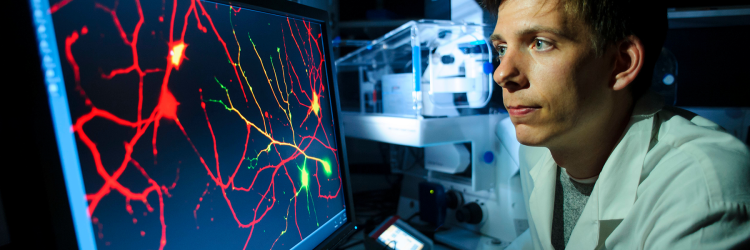Using epidemiology to learn more about diseases
Studying epidemiology is a core part of our research. Traditional epidemiological studies collect data to study the patterns, risk factors and causes of diseases in certain populations (i.e. areas, age or ethnic groups). These kinds of studies are, and will continue to be, an important focus of our research.
However, epidemiology is rapidly evolving. Studies are now harnessing the power of new tools (for example, genetic sequencing) to unlock the potential of new discoveries being made.
Research into the patterns of conditions such as MS can provide us with information that might help us identify the genetic and environmental causes of those conditions. In turn this could open new paths to preventing these diseases developing in the future and give very powerful clues to what our scientists in the labs should be focusing on when looking for treatments.
Using existing studies and knowledge to discover new treatments
To help laboratory researchers with drug discovery we carry out big data studies known as meta-analysis. Using meta-analysis means using the results from tens of thousands of scientific publications from around the world – drawing together all the work that has been done by other scientists to make sure that we are all working together.
To undertake a meta-analysis, the researchers use a structured and unbiased way to identify, assess and text-mine all relevant publications, then draw together the findings using statistics. It’s a really powerful method to identify small molecules that might work in a way that hasn’t been thought of before. It’s complementary to the lab research too, because each method can inform and guide the other.
Researchers used this method of research to identify the drugs currently being tested in the MND-SMART clinical trial for which the Anne Rowling Clinic is the lead trial centre.
Clinical trials
Clinical trials provide researchers with the data they need to assess whether a potential drug or treatment works in real-life, out of the laboratory.
Volunteer research participants are recruited to trials and undergo a series of tests so the researchers can capture data. This can include medical tests, such as blood tests or brain scans alongside other assessments such as questionnaires or details in medical records.
The research participants are usually split into two groups, one group taking the test treatment and the other group taking a placebo (dummy drug). Usually, the study is “double blind” which means that neither the participants nor the trial staff know which group people are in. Large numbers are needed in each group so that the researchers can be sure that any effect seen is due to the drug.
Once the data is collected, and the researchers have de-coded the groups and analysed the information, they can compare the results from the two groups. This will show if the treated group experienced any benefits that the placebo group didn’t, i.e. indicating whether the treatment works or not.
Clinical trials are incredibly complex and time-consuming. It can take years to establish the funding, financial arrangements, protocol, legal agreements, staff training, regulatory approvals from local and national governing committees and other paperwork.
Recruitment of participants, including ensuring that they are suitable for the study and that they understand all its implications, can also take months. Participants then usually need to be followed-up for months to years in order to see the potential effects of the treatment. Finally analysis and rigorous review by other scientists can take another year or longer.
It’s painstaking, but essential to maximise patient safety and the likelihood that any positive effect seen is genuine and that the regulators who license medicines for public use, have the evidence they need to approve them.
The clinical trials that we curently have underway in the Anne Rowling Clinic are listed on our Find a Research Project page.





